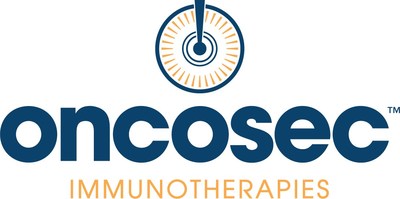OncoSec Medical Incorporated (OncoSec) (NASDAQ:ONCS), a company developing novel cancer immunotherapies, today announced an update regarding tumor responses in its KEYNOTE-695 global, multicenter Phase 2b, open-label trial of intratumoral delivery of TAVO
|
SAN DIEGO and PENNINGTON, N.J, /PRNewswire/ -- OncoSec Medical Incorporated (OncoSec) (NASDAQ:ONCS), a company developing novel cancer immunotherapies, today announced an update regarding tumor responses in its KEYNOTE-695 global, multicenter Phase 2b, open-label trial of intratumoral delivery of TAVO™ (tavokinogene telseplasmid / IL-12) with intravenous KEYTRUDA® (pembrolizumab) in patients with unresectable, advanced melanoma. The Company previously reported at the Society for Immunotherapy of Cancer's 33rd Annual Meeting (SITC) that, of the first nine patients to complete 12 weeks of treatment and reach initial tumor evaluation (by RECIST v1.1), two patients had a partial response. The Company now reports that both responses have been confirmed by blinded independent review at the first assessment timepoint. Further, in both cases, response duration has now reached six months. Importantly, one of these previously assessed partial responses has now become a complete response per investigator assessment at the six-month tumor evaluation timepoint. Enrollment is ongoing and the Company expects to complete the study next year. "Complete responses in this patient population are rare. One of the first partial responses to be observed in this study now being assessed by the investigator at six months as a complete response is exciting. Durable responses reaching the six-month mark demonstrate that the benefits of TAVO are clinically meaningful," said Daniel J. O'Connor, President and CEO of OncoSec. "The evidence of the potential of TAVO™ in conjunction with PD-1 inhibition to improve outcomes in this patient population is mounting and we look forward to providing updates as necessary regarding the progress of this trial." KEYNOTE-695 enrollment criteria with respect to anti-PD-1 checkpoint failure is highly restrictive. In order to be considered an anti-PD-1 checkpoint failure, all patients must have Stage III/IV metastatic melanoma progressive disease after at least four prior cycles of either KEYTRUDA® or OPDIVO®. Literature suggests that retreatment with a PD-1 therapy following failure of a PD-1 therapy offers approximately a 5% response rate1. Disease progression is determined according to RECIST v1.1, measured by radiologic assessment, with confirmation of progression by second assessment. "It's becoming clear that TAVO™ can reverse PD-1 resistance in refractory metastatic melanoma patients. This is important because the majority of melanoma patients do not respond to PD-1 treatment," said Adil Daud, MD, HS Clinical Professor, Department of Medicine (Hematology/Oncology), UCSF; Director, Melanoma Clinical Research, UCSF Helen Diller Family Comprehensive Cancer Center and Lead Principle Investigator of KEYNOTE-695. "Patients in KEYNOTE-695 have unequivocally failed all approved anti-PD-1 therapies. The tumor responses seen in this trial, now independently verified by a blinded review at the first assessment, deepening and continuing for months, gives us confidence in the potential of this treatment combination for patients who are non-responsive to anti-PD-1 therapy." Eligible patients in KEYNOTE-695 had refractory, locally advanced or metastatic disease defined as unresectable Stage III/IV metastatic melanoma that had definitively progressed on a full-course of anti-PD-1 treatment with KEYTRUDA® (pembrolizumab) or OPDIVO® (nivolumab). As previously reported, TAVO™ was well-tolerated, with primarily Grade 1 adverse advents associated with injection site or procedural pain. One TAVO™ related Grade 3 SAE of cellulitis was reported and resolved. KEYNOTE-695 is expected to be completed in 2019. Based on the outcome of the study, the Company plans to file for accelerated approval by end of 2019 or early 2020. TAVO™ has received both Orphan Drug and Fast-Track Designation by the U.S. Food & Drug Administration. 1 Long GV, Weber JS, Larkin J et al. Nivolumab for patients with advanced melanoma treated beyond progression: analysis of 2 Phase 3 clinical trials. JAMA Oncol. 3(11), 1511–1519 (2017). About OncoSec Medical Incorporated KEYTRUDA® is a registered trademark of Merck Sharp & Dohme Corp., a subsidiary of Merck & Co., Inc. Cautionary Note Regarding Forward-Looking Statements Forward-looking statements are neither historical facts nor assurances of future performance. Instead, they are based on management's current preliminary expectations and are subject to risks and uncertainties, which may cause our results to differ materially and adversely from the statements contained herein. Potential risks and uncertainties that could cause actual results to differ from those predicted include, among others, the following: uncertainties inherent in pre-clinical studies and clinical trials, such as the ability to enroll patients in clinical trials and the risk of adverse events; unexpected new data, safety and technical issues; our ability to raise additional funding necessary to fund continued operations; and the other factors discussed in OncoSec's filings with the Securities and Exchange Commission. Undue reliance should not be placed on forward-looking statements, which speak only as of the date they are made. OncoSec disclaims any obligation to update any forward-looking statements to reflect new information, events or circumstances after the date they are made, or to reflect the occurrence of unanticipated events. CONTACT Media Relations:
SOURCE OncoSec Medical Incorporated |
||
Company Codes: NASDAQ-SMALL:ONCS |





